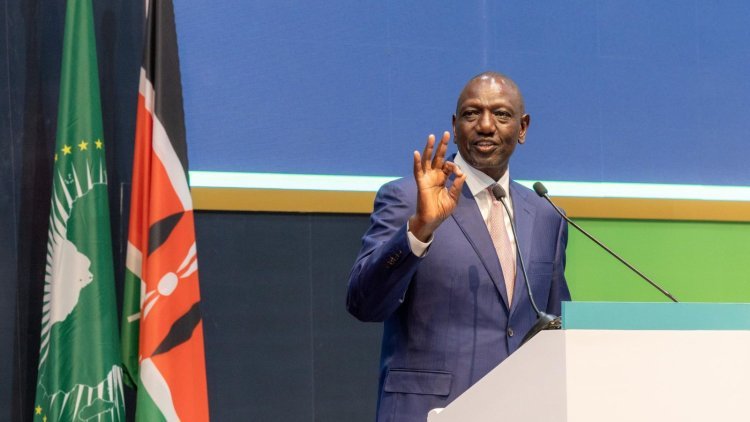'Mambo Ni Matatu' & Other Funny Phrases That Shaped 2023
In Kenya, anything tiny to anything huge can be developed into a meme or a funny phrase with the click of a button on a computer, or through the magic fingers in a smartphone, anywhere and anytime.

Changes aplenty, most of them affecting the cost of living, but one thing that doesn't seem to go away is Kenyans' consistency in turning otherwise common words into funny phrases that have trended throughout 2023.
In Kenya, anything tiny to anything huge can be developed into a meme or a funny phrase with the click of a button on a computer, or through the magic fingers in a smartphone, anywhere and anytime.
However, this year has been unique as President William Ruto and his deputy, Rigathi Gachagua have made headlines through phrases that have turned them into online celebrities for the better part of the year.
Viral Tea takes a look at phrases that tickled your Kenyan funny bone in 2023:
Mambo Ni Matatu
The phrase started as a bold threat by President William Ruto towards sugar cartels in the country as he reiterated that he would not allow the individuals to bring down the sugar industry when he was making inroads to revive it and regulate it in the process.
Ignoring the backlash he faced over his 'waende mbinguni' remarks, Ruto repeated the three options he laid on the table to the cartels; to either flee the country, risk jail terms or 'go to heaven'.

President William Ruto speaking at the Africa Climate Summit at KICC on September 5, 2023. /PCS
"Corrupt officials, cartels and thieves, those misusing public coffers have destroyed Mumias and Nzoia companies because everything has become a mess and then they are coming here and pretending. They should leave Kenya, and if they don't leave, we will jail them, and if they continue, they should make plans to go to heaven," he addressed at the Kenya
This resolute stance from the President has now taken on a life of its own in Kenyan culture. It has transcended politics and found its place as a meme and an innovative marketing strategy across diverse industries.
However, the President would swoop in and trademark the phrase, meaning anyone wishing to use the phrase alongside the three fingers must now seek permission from Ruto.
Mwalimu wa Maths
In a hilarious video, a Kenyan soldier was seen and heard savagely taking a swipe at his former Mathematics teacher.
The member of the disciplined forces and two of his other colleagues poke fun at their tutors who said that they would never amount into something.
Birthing the phrase ‘Mwalimu wa math, ulisema siwezi enda mbali. Hapa ni wapi?‘ (Math teacher, you said I couldn’t go far. Where am I now?). The video became an online sensation, especially on TikTok.
Kitakuramba
Kitakuramba was advanced by Pastor Paul Mackenzie after he was arrested over links to cultism. So popular was the phrase that it made the list of the 10 most famous phrases in the world by the Associated Press (AP).
The famous words were propagated by Mackenzie to scare away state officers who went to arrest him, following the infamous massacre of hundreds of people in his church.
In a veiled threat against police officers while at the back of a police car, Mackenzie said their actions would haunt them (kitawaramba), warning that they had no idea what they were up against.
The word, however, quickly took a life of its own with Kenyans now using it in their everyday conversations including mocking the Kenya Kwanza administration led by President Ruto over unfulfilled promises and generating sports-related memes.
Kaveve Kazoze
Kaveve Kazoze, a hit song by Spider Clan, became an internet sensation in May with its relatable lyrics that sent social media into a frenzy, spawning popular refrains at nightclubs.
The Naivasha-based Gengetone artistes led by Mary Wangeci, popularly known as Ngesh Bad Gal, became famous overnight after releasing an official video of the rap song also widely known as 'Cash Crop Za Nyandarua Ni Mawaru'.
The song also became some sort of a meme as it was shared widely across platforms popular with young people such as TikTok. It attracted the attention of some politicians including former Nairobi Governor Mike Sonko and nominated senator Karen Nyamu who pledged to support the group in their music journey.
The song has garnered more than four million views on YouTube.
Mpoa, Mverified or Mpermanent
These are phrases used to denote the status of one's relationship.
Mpoa refers to a boyfriend or girlfriend while Mverified refers to a publicly acknowledged partner, one who has been formally introduced to both families.
Mpermanent refers to one's spouse.
Ni God
This is a common phrase that has been used when someone is referring to a certain success they have achieved in their life.
A case in point is when Phil Director was hosting President Ruto for an interview and when the President acknowledged Phil’s success, he said, "Ni God".
Ni Nini Ladies
Acclaimed filmmaker Abel Mutua was broadly smiling in an interview when he was distracted by a group of unseen women appeared to be admiring him.
"Ni nini ladies? (What is it ladies?)," he posed before he noticed that they were admiring his puffed up chest. The original version was watched on TikTok more than 6 million times, turning the phrase into a viral senstation.
Kafukuswii & Where Are The Whips
This is a trending word that originated from content creator Andrew Kibe in 2022 after relocating to the United States (US) and starting his podcast.
In his livestreams, Kibe is heard mentioning the word ‘Kafukuswii’, a word is borrowed from a Kikuyu word Kabuku, which means a rabbit, an animal known to be timid and shy. So, according to Kibe, Kafukuswii can mean a lady or a man who is stuck in a relationship that is not working and is shy to move on or accept it.
Kibe mentions the phrase especially when talking about a relationship that is stagnating, often using the word to show one partner is not actively involved or contributing in the relationship. This couple is often cheating hence one partner to be referred as ‘Kafukuswii’.
Kafukuswii can also refer to someone who is timid and shy and who doesn’t like approaching women, doing everything to please a woman without her giving something in return.
In Kiswahili ‘Fukuza’ means chasing after, thus kafukuswii was coined as the less brutal term for simping, which is a Generation Z term that means 'to try too hard to do what someone wants, especially in a romantic relationship.'
As his way of punishing simping, Kibe, known for his no-holds-barred criticism of Kenyan celebrities, utters "where are the whips?" in his YouTube videos.

Andrew Kibe while at Kiss FM studios during a past radio show. /THE STAR
Truthful Man
DP Gachagua popularised this phrase during his appearance for the Deputy Presidential debate in 2022.
"I am a truthful man, I don't take alcohol, I wake early to attend meetings," he said while introducing himself during the debate.
Since then, he has used it religiously while taking swipes at his political detractors or defend the government as well as assuring Kenyans and investors that the Kenya Kwanza government will keep its campaign promises.
Other Phrases in Summary
- Mbwakni – simply means fake; it was invented by Wizzo Tano Nane in 2019.
- Kwani ni Kesho –means, 'Is it tomorrow?', a phrase usually associated with Buruklyn Boyz.
- Pulahia maisa – means enjoy life; it was discovered by Bena wa Malines
- Sherehe – almost used every day; it means to party and have fun. When someone tells you “tupige sherehe”, he/she is simply asking you out for some drinks or even some good time together.
- No kugeria mani – a Kikuyu word that means “I am just trying”, though in real sense it can be interpreted as someone who is doing well.
- Wueh- an exclamation, reaction word or an expression word discovered and usually used by Kenyans. The word is used in a conversation between two people to show dismay, disbelief or even humor.
- Sabi Girl – refers to Ayra Star. In Nigeria, the phrase “Sabi” is used to mean “To Know”, thus a Sabi girl refers to a woman who knows her craft.
- Mubaba – means a sponsor or a sugar daddy
- Mumama – popular among the youth, it simply describes a well-built lady who can sponsor a young man.
- Cheza kama wewe – a phrase that asks you to do something amazing, as a lot is expected from you.






